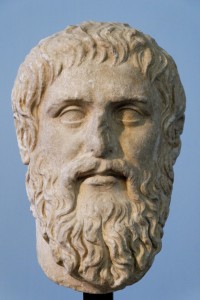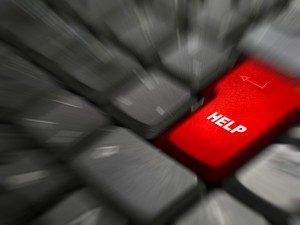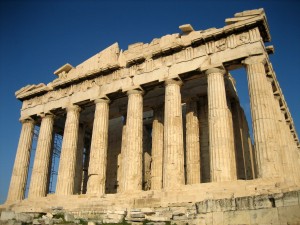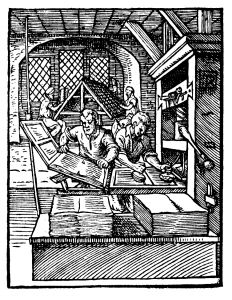One of the more interesting ideas in the readings was that of writing as a social, collaborative process that is positive for a community. Despite some strong skepticism at its outset, writing has undoubtedly brought many societal advantages as it has evolved, and the same benefits identified in Greek society have stayed true throughout the ages, albeit on a growing scale. Writing allows us to carefully formulate, widely disseminate, and preserve our ideas, as well as exchange varied opinions in a communal environment. But even as our technologies for creating and consuming writing have radically changed, problems with literacy and access have followed.
 When writing was still a new invention in Ancient Greece, philosophers gave much thought to its advantages and shortcomings. Plato’s now famous lines in Phaedrus outline some of writing’s most significant dangers: it would weaken memory, for one, and a written text, being private and unresponsive, must not to be relied upon. Despite these warnings, however, the new technology soon became widespread in Ancient Greece. Baron notes that writing became important culturally, and was used in a variety of contexts, including business, law, personal relationships, and literature. Writing, in fact, “turned out to be neither more nor less reliable or ambiguous than the spoken word, and it was just as real.” This shows that Greek citizens were loyal adopters of the technology, but it is important to note that writing also carried important societal benefits that seem to go against Plato’s warnings.
When writing was still a new invention in Ancient Greece, philosophers gave much thought to its advantages and shortcomings. Plato’s now famous lines in Phaedrus outline some of writing’s most significant dangers: it would weaken memory, for one, and a written text, being private and unresponsive, must not to be relied upon. Despite these warnings, however, the new technology soon became widespread in Ancient Greece. Baron notes that writing became important culturally, and was used in a variety of contexts, including business, law, personal relationships, and literature. Writing, in fact, “turned out to be neither more nor less reliable or ambiguous than the spoken word, and it was just as real.” This shows that Greek citizens were loyal adopters of the technology, but it is important to note that writing also carried important societal benefits that seem to go against Plato’s warnings.
Enos adds another key advantage: the fact that writing was a public, social activity. Since these Greek societies had many citizens participating in writing and reading, it created a community that “could benefit from the interaction of comment and response, much like … (they) … could benefit from the interchange inherent in the social dynamics of discussion.” In addition, since writing requires more deliberate focus and a larger time investment, it not only better preserves ideas for the long-term, but is also more effective than discourse for formulating advanced arguments, tackling complex problems, and producing creative works (Enos 10).
At this point, these societal benefits of writing could not spread beyond a particular community such as a Greek city-state. This would change later on, however: first with the invention of the printing press, and in recent years with the explosion of the internet. Both of these writing technologies brought radical changes, but we still see the same benefits described by Enos, only now on a more global scale. Enos depicted early Greek writing as “an activity that facilitated widespread complex thinking” and education; after Gutenberg’s invention of the printing press, writing and ideas could suddenly be disseminated to a broader audience that crossed political and cultural borders, reaching societies that could not have engaged in oral discourse with the writer.
 To apply this discussion to the modern day, the internet now allows for writing and ideas to spread globally at the push of a button, spreading complex thinking on a public scale never before conceived. Enos described how the interaction of comment and response benefits the community, and current technologies such as blogs and wikis build a similar community of writers and readers, but with even more collaboration and interactivity. In a blog article, for example, the traditional division between author and audience is shattered, as readers can post comments directly on a written text, and the author can respond to them. In the case of wikis, a community of writers can share their personal knowledge and craft a piece of writing together. Despite these technological capabilities, however, some of these advantages quickly become problematic. Most bloggers on larger media outlets or highly trafficked sites do not reply to their reader comments, and the comment section is sometimes even buried on a secondary page. With wikis, the relative anonymity of authors can damage the credibility of what they write. Nevertheless, these new concepts of social writing communities offer a wealth of benefits for the spread of ideas and growth of knowledge.
To apply this discussion to the modern day, the internet now allows for writing and ideas to spread globally at the push of a button, spreading complex thinking on a public scale never before conceived. Enos described how the interaction of comment and response benefits the community, and current technologies such as blogs and wikis build a similar community of writers and readers, but with even more collaboration and interactivity. In a blog article, for example, the traditional division between author and audience is shattered, as readers can post comments directly on a written text, and the author can respond to them. In the case of wikis, a community of writers can share their personal knowledge and craft a piece of writing together. Despite these technological capabilities, however, some of these advantages quickly become problematic. Most bloggers on larger media outlets or highly trafficked sites do not reply to their reader comments, and the comment section is sometimes even buried on a secondary page. With wikis, the relative anonymity of authors can damage the credibility of what they write. Nevertheless, these new concepts of social writing communities offer a wealth of benefits for the spread of ideas and growth of knowledge.
 In addition to these online technologies, there are also other interesting contemporary examples of writing as a beneficial social process. Academic writing, for one, is commonly referred to as “scholarly communication:” an ongoing dialogue between a group of scholars that is continued through the writing of articles and monographs. In our educational system, writing is social from the earliest moments of grade school learning to college-level writing labs and workshops. Even in the world of fiction, many authors are opening up the process to their readers, inviting them to share ideas and suggestions to improve future stories. In all of these examples, discourse plays a role as well: scholars give talks, teachers instruct their pupils by lecturing, and authors give readings to crowds large and small. But in order to form fixed ideas of sufficient complexity, writing is overwhelmingly the preferred technology.
In addition to these online technologies, there are also other interesting contemporary examples of writing as a beneficial social process. Academic writing, for one, is commonly referred to as “scholarly communication:” an ongoing dialogue between a group of scholars that is continued through the writing of articles and monographs. In our educational system, writing is social from the earliest moments of grade school learning to college-level writing labs and workshops. Even in the world of fiction, many authors are opening up the process to their readers, inviting them to share ideas and suggestions to improve future stories. In all of these examples, discourse plays a role as well: scholars give talks, teachers instruct their pupils by lecturing, and authors give readings to crowds large and small. But in order to form fixed ideas of sufficient complexity, writing is overwhelmingly the preferred technology.
Despite all of these advantages of the social processes of writing, similar challenges have also continued since the earliest days of writing in Ancient Greece. The most notable problem is the question of access: who is able to read and write. Baron cites Harris who states that the literacy rate in Greek was well under 10 percent, so Enos’s vibrant community of writers and readers was in fact made up of a small subset of the whole population. Literacy has been a crucial issue in just about all societies ever since, as only those who are literate will benefit from the theories, arguments, and creative works which are recorded primarily in written form. As our societies became increasingly globalized, nations with lower literacy rates faced significant challenges. Also, in today’s digital world with blogs and wikis as increasingly common technologies for writing and sharing ideas, internet access is becoming another requirement. Much like literacy, this aspect of access is very unequally distributed, and holds back a significant percentage of the population from entering the conversation.
But Enos also argues that literacy is more than just a skill one either has or does not have; instead, it “has a range of meanings” which together form a more complex picture of citizen participation in a society of writing. While he focuses mostly on the transition in Greece from a mechanical skill to an intellectual activity, this point also translates very well to our contemporary situation. Today, there are different types of literacy that are needed in order to become an intelligent contributor to the conversation. Clearly, there is literacy in the sense of being able to read and write, type or otherwise record thoughts and ideas. But there is also the emerging concept of “information literacy,” which is a set of skills for finding, evaluating and using written information. For example, in our digital world, one can find billions of webpages on any topic using Google and Wikipedia, but it is crucial to evaluate their authority since anyone can now publish at the push of a button. Also, as mass media becomes more consolidated and corporatized, readers need to understand and take into account biases and conflicts of interest.
 A skeptical attitude towards written information is certainly nothing new—Clanchy, for example, describes how writing was initially considered less trustworthy than spoken words in Medieval England—but the skills of evaluating writing when unlimited information is immediately accessible is a challenge unique to the digital age. Up until very recently when print books were the dominant force and more and more authors could share their ideas, it was a safe assumption that published writing had gone through a process of vetting, including editing and fact-checking, and that it could be considered trustworthy. Of course, there were exceptions, such as self-published print works and propaganda created by a government or organization for a particular purpose. But today there is much less of a guarantee that writing found online will have undergone any editing at all, and it can easily be opinion masquerading as objective fact. Some writing may even be completely fabricated, such as the quote allegedly spoken by late French composer Maurice Jarre which was posted on Wikipedia as an experiment and subsequently picked up by many major news outlets. Although members of our society may be fully literate in the traditional sense, they will not have full access to the exchange of knowledge and ideas without this set of skills. It is also often assumed that younger generations, the “digital natives,” are inherently skilled at finding and evaluating writing online, but research suggests this is not the case, as many students lack these crucial information skills and are often completely reliant on Google and Wikipedia (Duke and Asher 41). The convenience of accessing a written text in one click often outweighs factors such as the quality and trustworthiness of the author’s argument.
A skeptical attitude towards written information is certainly nothing new—Clanchy, for example, describes how writing was initially considered less trustworthy than spoken words in Medieval England—but the skills of evaluating writing when unlimited information is immediately accessible is a challenge unique to the digital age. Up until very recently when print books were the dominant force and more and more authors could share their ideas, it was a safe assumption that published writing had gone through a process of vetting, including editing and fact-checking, and that it could be considered trustworthy. Of course, there were exceptions, such as self-published print works and propaganda created by a government or organization for a particular purpose. But today there is much less of a guarantee that writing found online will have undergone any editing at all, and it can easily be opinion masquerading as objective fact. Some writing may even be completely fabricated, such as the quote allegedly spoken by late French composer Maurice Jarre which was posted on Wikipedia as an experiment and subsequently picked up by many major news outlets. Although members of our society may be fully literate in the traditional sense, they will not have full access to the exchange of knowledge and ideas without this set of skills. It is also often assumed that younger generations, the “digital natives,” are inherently skilled at finding and evaluating writing online, but research suggests this is not the case, as many students lack these crucial information skills and are often completely reliant on Google and Wikipedia (Duke and Asher 41). The convenience of accessing a written text in one click often outweighs factors such as the quality and trustworthiness of the author’s argument.
Overall, writing has been a social process from the outset, as we saw in Ancient Greece, and the same benefits relating to the advancement and sharing of ideas have continued in diverse societies. Today, we have radically different, highly interactive ways to write and exchange ideas digitally, which take the concept of a writing community even further. Interestingly, as pointed out by Baron, many of the complaints by technophobes today echo Plato’s earliest complaints about writing. Now we hear how computers—desktops, laptops, tablets, and smartphones—are becoming dangerous substitutes for human memory and serve to alienate members of society instead of connecting them. Current writing technology platforms offer incredible possibilities, but they do need widespread trust to have a beneficial effect on society. Hopefully these warnings will be heard and kept in mind by the public, but that exciting new benefits will also be recognized by the skeptics. In addition, we need to understand that literacy today goes far beyond just being able to read and write, and strive to ensure that all members of our societies can fully join the writing community.
To conclude, a trio of images:



Readings Cited:
ABC News (Australian Broadcasting Corporation). “Student’s Wikipedia hoax dupes newspapers: report.” 05/07 2009. Web. <http://www.abc.net.au/news/2009-05-07/students-wikipedia-hoax-dupes-newspapers-report/1674760>
Baron, Dennis E. A Better Pencil: Readers, Writers, and the Digital Revolution. Oxford ; New York: Oxford University Press, 2009.
Clanchy, M. T. From Memory to Written Record, England 1066-1307. 2nd ed. Oxford ; Cambridge, USA: Blackwell, 1993. 294-327.
Enos, Richard Leo. “Ancient Greek Writing Instruction.” A Short History of Writing Instruction from Ancient Greece to Modern America. Ed. James J. Murphy. Mahwah, NJ: Hermagoras, 2001. 9-34.
Plato. Phaedrus. Ed. C. J. Rowe. Warminster, Wiltshire, England; Atlantic Highlands, N.J.: Aris & Phillips; 1986.
Additional References:
Association of College and Research Libraries. “Information Literacy Competency Standards for Higher Education.” Web. <http://www.ala.org/acrl/standards/informationliteracycompetency>.
Duke, Lynda M., and Andrew D. Asher. College Libraries and Student Culture. Chicago: American Library Association, 2011.
Image credit: Jastrow (Plato), djayo (“help”)